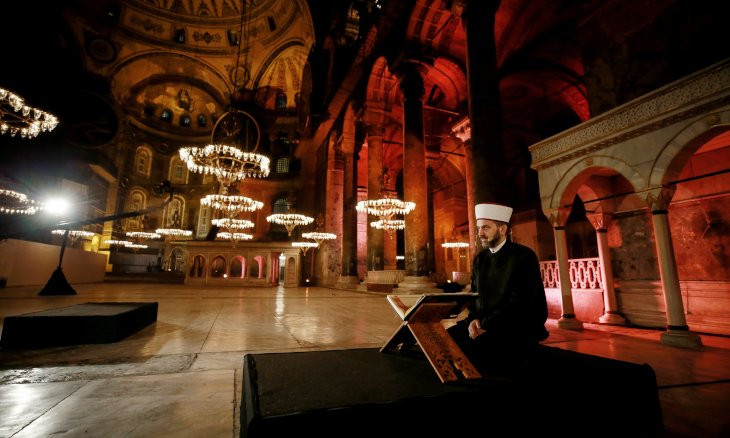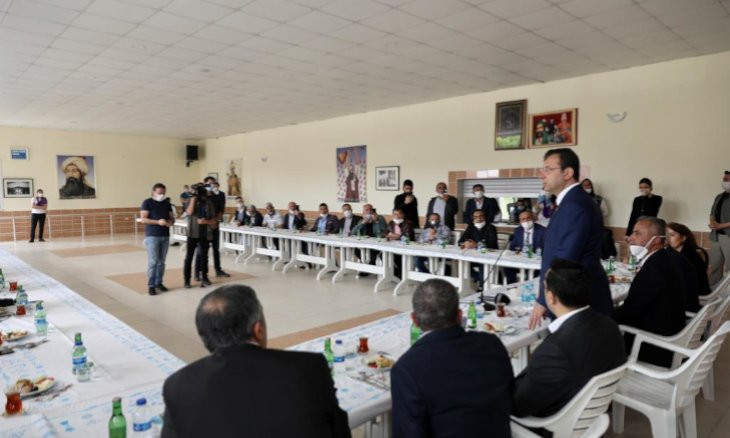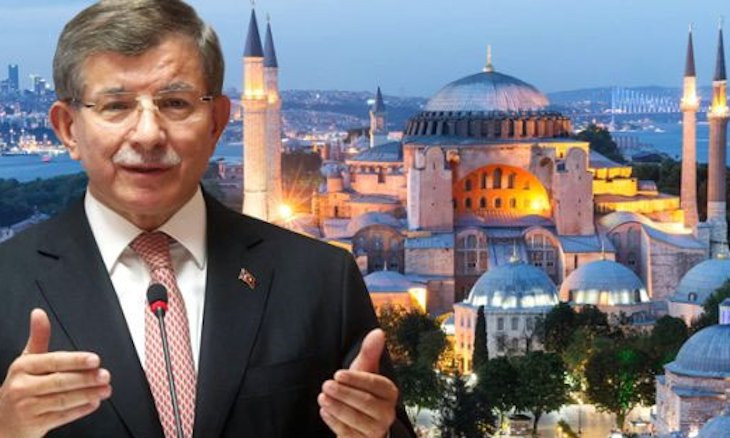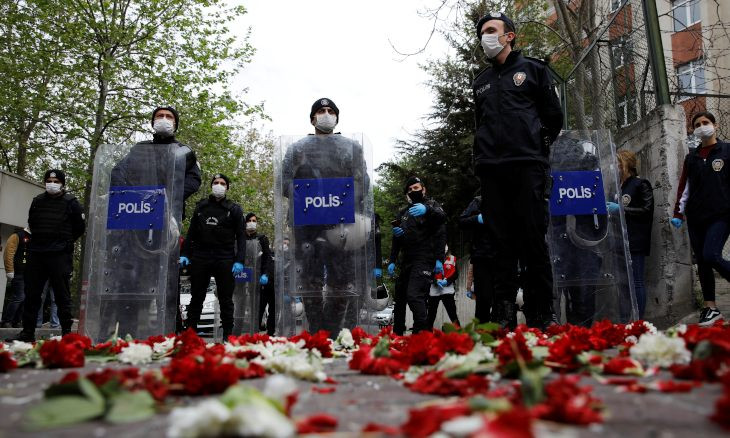US criticizes Turkey for deportations, entry bans of non-Muslims in its report on religious freedoms
The U.S. has criticized Turkey over deportations and entry bans of non-Muslims in its report on religious freedoms. The State Department cited community sources as saying that some of the deportations and entry bans during the year targeted foreign-citizen members of the community who had lived legally, as long-term residents, in the country for decades and who had previously not experienced any immigration difficulties.
Duvar English
 Islamic prayers held at Istanbul's Hagia Sophia to mark 567th anniversary of Ottoman conquest
Islamic prayers held at Istanbul's Hagia Sophia to mark 567th anniversary of Ottoman conquestThe United States has criticized Turkey over deportations and entry bans of non-Muslims in its report on religious freedoms.
The report titled, "2019 Report on International Religious Freedom: Turkey" said that the Turkish government continued to limit the rights of non-Muslim religious minorities, "especially those not recognized under the government’s interpretation of the 1923 Lausanne Treaty," which includes only Armenian Apostolic Orthodox Christians, Jews, and Greek Orthodox Christians.
"Minority communities continued to object to the prevention of governing board elections for religious foundations. The government continued to restrict efforts of minority religious groups to train their clergy," the report by the U.S. State Department said, while also giving examples of the practice.
"Religious minorities again reported difficulties opening or operating houses of worship; resolving land and property disputes and legal challenges of churches whose lands the government previously expropriated; operating or opening houses of worship; and obtaining exemptions from mandatory religion classes in schools. The government did not return any church properties seized in previous decades," it added.
The report touched upon the challenges faced by religious minorities, particularly members of the Alevi community, on religious content and practices in the public education system.
Long-term tourist residence extensions denied
According to the report, multiple monitoring organizations and media outlets, including Middle East Concern, International Christian Concern, World Watch Monitor, Mission Network News, and Voice of Martyrs, reported entry bans, denial of residency permit extensions, and deportations for long-time residents affiliated with Protestant churches in the country.
It also cited the Interior Ministry's announcement on denying extension requests to long-term residents for tourist purposes, in the absence of another reason to request a residency permit, which poses a challenge on several religious minority ministers, including Christians, in conducting religious services while resident in the country on long-term tourist residence permits.
 Istanbul Municipality to build cemevis, says Mayor İmamoğlu
Istanbul Municipality to build cemevis, says Mayor İmamoğluWhile similar measures occurred in previous years, the report said that multiple groups reported they perceived a significant increase in the number of removals and entry bans during the year.
"Multiple reports said these Protestant communities could not train clergy in the country and relied on foreign volunteers to serve them. Local Protestant communities stated they aimed to develop indigenous Turkish leaders in their congregations because it was becoming increasingly difficult to rely on foreign volunteers; however, they faced difficulties because they could not operate training facilities in-country," the report read.
Long-term residents face difficulties
The State Department also cited community sources as saying that some of the deportations and entry bans during the year targeted foreign-citizen members of the community who had lived legally, as long-term residents, in the country for decades and who had previously not experienced any immigration difficulties.
According to community members, these immigration procedures also affected a local community’s ability to raise funds for local churches because foreign clergy members attracted individual donations and support from church communities in their countries of origin.
 Gov't shouldn't use Hagia Sophia as political leverage: Former PM Davutoğlu
Gov't shouldn't use Hagia Sophia as political leverage: Former PM Davutoğlu"Some of the individuals with entry bans or resident permit denials requested review of their immigration status through the country’s legal system. None of the cases reached conclusion by year’s end and could take several years to resolve due to the complexities of and backlog in the judicial system, according to media report," it said.
'Hagia Sophia is a site of extraordinary significance'
The State Department also commented on President Recep Tayyip Erdoğan's recent remarks on Hagia Sophia's status, saying that it is the site of extraordinary significance and "symbol of coexistence."
"Senior U.S. government officials continued to publicly, and privately with government officials, express their understanding of the Hagia Sophia as a site of extraordinary significance, and to support its preservation in a manner that respects its complex multireligious history. They underscored the importance of the issue with government officials and emphasized that the Hagia Sophia is a symbol of peaceful coexistence, meaningful dialogue, and respect among religions," it said.
Attacks on places of worship
The attacks on several Christian and Jewish places of worship were also cited in the report, including those on the Surp Hreshdagabet Armenian Church in Istanbul's Balat district, the Mardin Protestant Church and the Beth Israel Synagogue in the western province of İzmir.
In January three assailants threw a “sound” grenade at the door of the Mardin Protestant Church. The suspects were detained and released after making statements to police.
 Human rights groups say Turkish gov't uses coronavirus to restrict freedoms
Human rights groups say Turkish gov't uses coronavirus to restrict freedomsIn February, unknown assailants sprayed graffiti on the doors and walls of the Surp Hreshdagabet Armenian Church that included derogatory messages. A representative of community foundations to the GDF, Moris Levi, said in a statement that police had launched an investigation and received security camera footage of the incident. According to the community, the perpetrators had not been found by year’s end.
In March a person attempted to vandalize the Beth Israel Synagogue with a Molotov cocktail. The synagogue was not damaged in the incident. Police arrested and charged the individual for attempting to damage a place of worship. He stated his intention was to “protest Israel,” according to multiple media reports.
Halki Seminary remains closed
On the issue of the Halki Seminary remaining close, the State Department said that the they continued to call on the government to allow the reopening of Halki Seminary and to allow for the training of clergy members from all communities in the country.
"The Secretary of State and other senior U.S. government officials continued to urge government officials to reopen the Greek Orthodox seminary in Halki and allow all religious communities to train clergy in the country. In May the Charge d’Affaires and the Istanbul Consul General visited Halki to demonstrate ongoing interest in the reopening of the seminary. In October staff of the consulate general in Istanbul joined representatives from 24 other missions and the foreign ministry to visit Halki with Ecumenical Patriarch Bartholomew I. In April the Charge d’Affaires attended Easter services at the Greek Orthodox Cathedral of St. George to show support for religious minorities," the report read.
 Turkey second country to limit freedoms the most in past decade
Turkey second country to limit freedoms the most in past decade
